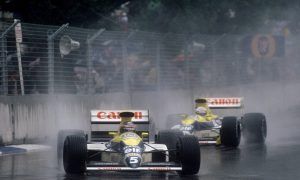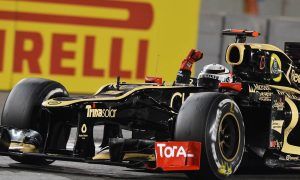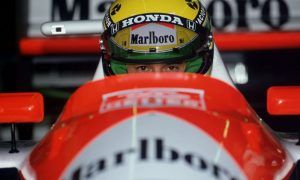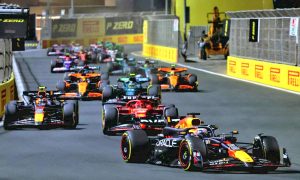ON INDYCAR

You’ve said your accident in Indycar in Michigan changed your life as a driver. Do you mean physically because you hurt yourself or mentally or both?
Both. I remember losing control. I remember the spin was so violent that it actually threw my head outside the cockpit because you don’t normally spin at 200 plus miles per hour. I don’t remember any of the impact. I came-to again right as the car stopped rolling down off the banking because I could see my legs bouncing along the ground. It never dawned on me when the car stopped that the front was completely gone off the car. I was not in any pain. I was just in sort of a stunned sense of the unknown, almost. It was hard to process what had happened and then the whole recovery period started but I was never the same driver afterwards because for me, having been hurt that badly, you’re aware of what the pain is like, you’re aware of what the recuperation is like. I knew I would never allow myself to go out on that ragged edge as far as I would have gone before that. Some people say that I was a better driver because of it because when you come inside the ragged edge but are still quick enough, your experience is actually of benefit to the next series of cars that you race. I was still good enough but I don’t think I was ever as fast after the accident because you’re just so aware of the consequences.
Given that, how do you feel as a father? Because your son’s doing Indy racing and he had a bit of a smack last week.
It’s an interesting situation for me to see Conor race. He raced his first Indy 500 when he was 21, a lot younger than we ever did anything like that. I never ever look at what he does and say “I wish he didn’t do it.” Yes, I’m aware of what could happen and in his accident in Texas, it absolutely jolted me when I saw it on television for the first time. It sends a funny feeling through your body because you again become aware of what might have happened. But I’m glad he does it because I know the satisfaction and the rewards this sport gives people. I watch a lot of sport and motor racing stretches and grows people more than any other sport I know. It stretches you physically, emotionally, intellectually further because of the danger levels that always are attached to what you do. So I’m glad Conor’s able to experience that. Also, it’s his dream so for a dad to see any of his kids truly live their dream, chase their passion, what more would you want for your kids?

©WRi2
Indy seems a lot more dangerous than Formula 1. Do you think Formula 1 has lost some of its appeal because it’s not dangerous enough?
Formula 1 has to be careful. It’s going down the vanilla homogenised route. The gladiator feel of Formula 1 is beginning to be dumbed down. Making it super safe will actually disconnect Formula 1 from the passionate fan base it’s had for all these years. The danger level and the danger zone of motor racing is what attracts the drivers in the first place and the fans. Formula 1, and IndyCar to a certain extent, has to be super careful they don’t do the politically correct thing and homogenise the sport to the point where people don’t consider it now as something that’s as untouchable as it was 25 years ago.
Any regrets about your F1 career?
When I look back on it, it was many, many, many years afterwards that I actually understood my Formula 1 career. When I went into television broadcasting in America, research is obviously a big part of what you do and I researched what separates a Schumacher, a Montoya, a Hamilton from the rest. I would be in a class with a Brundle, a Johansson, a Derek Warwick - we were all good enough to get into Formula 1 but never quite got up onto that superstar winning level. When I’m super critical about my career and how it unfolded and how my F1 days ended, I can see why I only lasted five years but I didn’t know it at the time. I wrote a book about six or seven years ago about what it takes to develop a complete champion package and it’s only when I wrote that that I could see my inadequacies, the shortfalls in my career. I didn’t have the discipline to understand the car from a technical side and work through car set-ups to make cars better. Without that, you automatically come to a point in car development where you’re no longer of use to a team. When I recognised that shortfall, what I did about it was to try and drive faster. When you try and drive faster, you go off the road more. It’s so clear now that I could have structured my career differently to potentially last longer.

©CahierArchive
Here’s the thing - it goes back to coming back from Australia, I went from winning the Formula Ford Festival in ‘77 to Formula 1 in 13 months. No one had ever done it that fast. I actually got there too fast. My success trajectory happened so fast that I didn’t learn the skills in each of the levels as I went along, so when I got to Formula 1, I was ill-equipped. I was living on my wits, instant reflex, survival, but I didn’t know that until years afterwards, because when you’re living in the moment, that’s all you do. You’re in a bubble of reactions and survival so if I were to do it all over again, I would have some sort of a coach to teach me the skills.
Today, drivers almost don’t need the ability to sort the car at a level that they needed in our day because there was no data. It was 100% driver feel that developed cars. Now the cars are 95% developed before you ever get into it and if they’re not fully developed, they don’t ask the driver how to develop it. They go to the wind tunnel or CFD or engineering or data or mechanical set-up or tyres. So the support level for drivers with pure skill and instant reflexes and brilliant ability is much greater today than it was in our day.
REPORT: Rosberg secures Baku pole as Hamilton crashes out
AS IT HAPPENED: Grand Prix of Europe - Qualifying
Silbermann says ... Ballrooms and having a ball in Baku
Chris Medland’s 2016 Grand Prix of Europe preview
Keep up to date with all the F1 news via Facebook and Twitter







